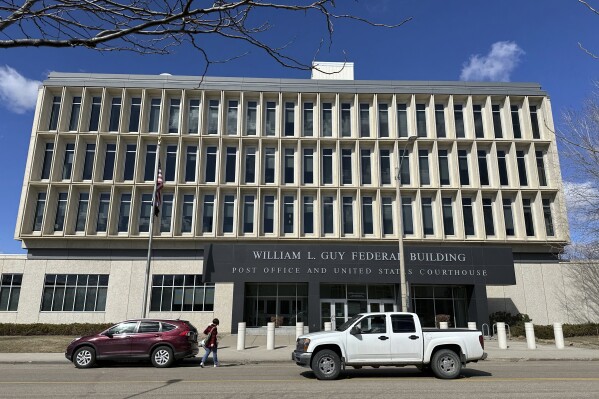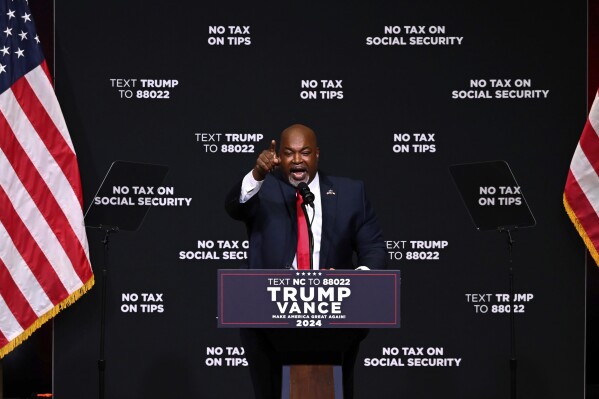NEW ORLEANS (AP) — A Texas county that wants to keep 17 books off its shelves — some dealing humorously with flatulence and others with issues including sex, gender identity and racism — argued its case Tuesday before 18 federal appeals court judges amid questions on whether the rights of the patrons or county officials were at risk.
Library patrons filed suit in 2022 against numerous officials with the Llano County library system and the county government after the books were removed. A federal district judge in Texas issued a preliminary injunction requiring that the books be returned in 2023. But the outlook became murkier when three judges of the 5th U.S. Circuit Court of Appeals split three ways on the issue in June — one saying all 17 books should stay on the shelves, another saying only eight had to stay, and another saying the court should leave it up to the county.
The upshot was that eight books were to be kept on the shelves. But the full court voted to toss that ruling and rehear the case. Tuesday’s arguments were heard by the 17 full-time judges of the 5th Circuit, plus Jacques Wiener, a senior 5th Circuit judge with a reduced workload who was part of the original panel.
It is unclear when the full court will rule.
Tuesday’s arguments
Judges closely questioned attorneys on both sides as attorneys supporting the county said government officials’ decisions in curating a library’s book selection amount to protected government speech.
“If private speech could be passed off as government by simply affixing a government seal of approval, government could silence the most powerful, unfavorable ideas,” Judge Leslie Southwick said. “It seems to me that there is a risk of that occurring here — that we are calling this particular activity, that occurred in this library, government speech, when in fact it is suppression of unpleasant, unacceptable ideas to some group of people.”
Judge Stuart Kyle Duncan was more sympathetic to the county, noting a litany of “weeding” guidelines libraries use in deciding which books to stock based on a variety of factors from the age and condition of the book to subject matter that could be considered outdated or racist.
He raised questions of whether a library could be allowed to remove an overtly racist book by former Ku Klux Klan leader David Duke or the children’s book “The Cat in the Hat,” which has been criticized for allegedly drawing on racist minstrel show culture.
“If a public librarian removes ‘The Cat in the Hat,’ has the public librarian violated the First Amendment?” Duncan asked.
“If the librarian removes ”the Cat in the Hat” because he or she is substantially motivated by suppressing the viewpoint in it, then yes,” said Matthew Borden, attorney arguing for the library patrons.
What are the books?
The books at issue in the case include “Caste: The Origins of Our Discontent” by Isabel Wilkerson; “They Called Themselves the K.K.K: The Birth of an American Terrorist Group,” by Susan Campbell Bartoletti; “In the Night Kitchen” by Maurice Sendak; “It’s Perfectly Normal: Changing Bodies, Growing Up, Sex and Sexual Health” by Robie H. Harris; and “Being Jazz: My Life as a (Transgender) Teen” by Jazz Jennings.
Other titles include “Larry the Farting Leprechaun” by Jane Bexley and “My Butt is So Noisy!” by Dawn McMillan.
Already divided
In June’s panel ruling, Wiener, who was nominated to the 5th Circuit by former President George H. W. Bush, said the books were clearly removed at the behest of county officials who disagreed with the books’ messages.
Another panel member was Southwick, a nominee of former President George W. Bush, who agreed with Wiener — partially. He argued that some of the removals might stand a court test as the case progresses, noting that some of the books dealt more with “juvenile, flatulent humor” than weightier subjects.
“I do not find those books were removed on the basis of a dislike for the ideas within them when it has not been shown the books contain any ideas with which to disagree,” Southwick wrote.
Also on that panel was Duncan, a nominee of former President Donald Trump, who dissented fully. “The commission hanging in my office says ‘Judge,’ not ‘Librarian.’ ” Duncan wrote.
Disclaimer: The copyright of this article belongs to the original author. Reposting this article is solely for the purpose of information dissemination and does not constitute any investment advice. If there is any infringement, please contact us immediately. We will make corrections or deletions as necessary. Thank you.



